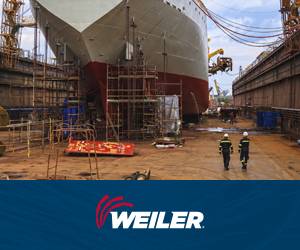A BERTH AW IN SHIPBUILDING
A BERTH AW IN SHIPBUILDING
YEARS of hard-won experience, covering every variety of work in a given field, find their supreme justification in a sudden emergency when new conditions challenge ingenuity and the only guide for an uncertain present is a perfected past. That, at any rate, is the experience of the Aberthaw Construction Company of Boston.
The entry of the United States into the world war produced an unexampled demand for the construction not only of plants capable of turning out vast quantities of actual munitions of war but of yards adequate to fashioning the ships for transporting men and material across the ocean and safeguarding their perilous errand. This, of course, meant waterfront development on a scale huge beyond previous dreaming of American ship-ping-folk or American builders.
But the magnitude of the work and its many novel problems held no terrors for the Aberthaw Company. Twenty-five years of missionary pioneering in the science, method and organization of building procedure had fitted the company to undertake any task and had given it assured confidence in the ability of its working force to win in the face of any and all obstacles.
Back in the days when the war was still a European conflict the company had constructed a machine shop and storehouse for the Fore River Shipbuilding Company, of Quincy, Massachusetts, with such success as to win the complete confidence of that great concern. Hence, when the threat of war stimulated the expansion program of the United States Navy, Aberthaw was again called upon; this time, however, to go into the wet and to erect a "cruiser slip" 1,000 feet long, capable of affording room for the construction of the most gigantic of giant battleships. This was followed shortly by destroyer slips, submarine slips and then by auxiliary additions to machine shop, boiler room and storage space.
The speed, precision and economy which char-acterized the successive steps in this enterprise made virtually inevitable the awarding to the company of the contract for building the Squantum Plant, the largest destroyer plant in the world, and, at the same time, the entrusting it with the responsibility of reaching stimultaneously into Providence, Rhode Island, and into Buffalo, New York, to erect in the one place a boiler factory and in the other a turbine plant in order that the Squantum destroyers, when launched, might be assured immediate means of swift locomotion. All this was at the instance of the Bethlehem Corporation, which had absorbed the old Fore River Shipbuilding Company.
At Squantum Aberthaw performed a miracle. In five months, most of which fell in the severest winter of history, the company turned an open marsh into a producing destroyer plant. Meanwhile, the Bethlehem Shipbuilding Corporation had called upon the company for another great accomplishment, the building of a $28,000,000 shipyard at Alameda, California. This, however, was less than a quarter done when the armistice halted the work.
Again in the service of the Bethlehem Shipbuilding Corporation, Aberthaw invaded the South, and at Sparrows Point, not far from Baltimore, added a three-slip extension to the existing shipyard and supplemented the standing series of submarine slips.
Marine railways for 2,500-ton ships were constructed after Crandall designs at Portland, Maine, and Fall River, Massachusetts, and the company began an interesting series of independent experiments in the design and building of concrete lighters and barges, which were, however, interrupted by the sudden end of hostilities.
This is the main outline of the Aberthaw Company's wartime contacts with problems of waterfront development. Out of the solving of these problems has come a vastly increased shipbuilding capacity for the United States, and for the Aberthaw Company a wealth not only of experience but of equipment. The day is almost at hand when ships flying the Stars and Stripes will crowd the seven seas. In the future growth of the American merchant marine Aberthaws expects to play an active part, particularly in the development of harbors for the better accommodation of increasing commerce, and in the construction of the dry- docks and repair plants necessary to keep the multiplied argosies of the world in sailing order.





